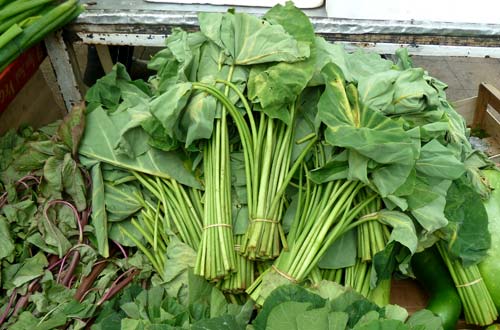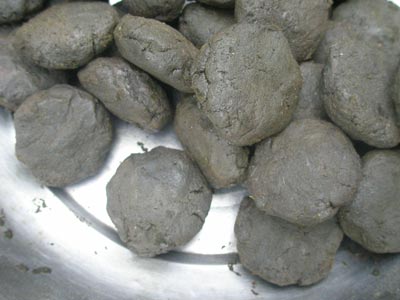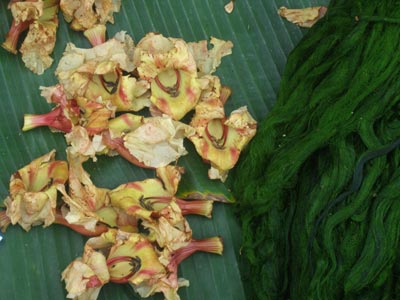
Taro leaves. Colocasia leaves. Taro is a name used to cover many root crops grown in tropical regions, most commonly Colocassia esculenta. The leaves come from plants cultivated in warm climates both for their leaves and tuberous, potato-like roots, or corms. The roots, the flesh of which may vary from white to pink, have a delicate flavour and can be peeled and boiled, roasted, mashed, fried or included in a stew and look like a pointed swede, often with a ridged surface and protruding roots, with hairy beige or brown skin. They may weigh as much as 2 kg (4¼ lb). The leaves are large and floppy, fan-like and used as a vegetable or in soups. Some varieties of taro grow extra corms which bud on the main corms, or dasheens. These "buds" are known as eddos, particularly in the West Indies. Taro is a good source of high-grade protein. Whole taros with the skin intact are preferable to those that come peeled.

Patties made from minced meat mixed with minced red onion and lemongrass, garlic, salt and MSG then deep fried in oil. They looked like lumps of charcoal in the market when I saw them there.

Indian trumpet flower. A strange plant that sheds enormous flowers overnight. They are said to lie on the ground around the tree looking like broken limbs. Laos, of course, has had unpleasant experience of broken limbs and they know whereof they speak. It is reputed to be the most bombed nation in the world. The plant has edible leaves, stems and flowers, and is also used in traditional medicines.
"Humming bird." Scarlet wisteria. Sesbania. A small tree which produces feathery leaves, pods and flowers. The flowers are used in curries.
Fish, preferably catfish, grilled, boned and then crushed with grilled aubergine (US: eggplant), this mixture fried with beansprouts and whatever fresh ingredients are to hand.